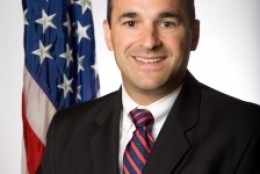Danny Werfel
-
Entering a federal agency for the first time as an appointed manager can be daunting. Tom Temin got a breakdown from Boston Consulting Group's Daniel Werfel.
February 04, 2021 -
Though the latest Best Places to Work in the Federal Government rankings show the resiliency of agencies in the face of a tumultuous 2019, they also point to some unsettling signs for organizations facing reorganization and relocation.
December 17, 2019 -
Current and former federal real property experts have suggested a civilian version of the Defense Department's controversial base realignment and closure (BRAC) process.
June 18, 2019 -
The IRS's decision to begin this year's tax filing season on time, and to start issuing tax refunds despite a partial government shutdown, appears legally sound, according to former government officials, but raises logistical questions from lawmakers and current agency employees.
January 10, 2019 -
The Trump administration's plan to reduce non-defense discretionary spending by 10 percent means civilian agencies will need to look at programs and personnel, not just for this year, but for the long-term. Some fiscal observers says it's time to consider budget process reform.
March 01, 2017 -
Legislation proposed by a House Republican would eliminate the Environmental Protection Agency by the end of 2018. Some say it's political grandstanding, while others suggest maybe it's time for an update to EPA. But what would it take to dismantle a large federal agency?
February 13, 2017 -
President Barack Obama in February presented his eighth and final budget, which includes a list of programs he'd like to see reduced or ended. How and why do programs end up on the chopping block, and what might save them from the cut?
March 11, 2016 -
Call it the eighth year syndrome. It's the last year of a presidency and scores of politically appointed slots throughout the federal government are vacant, and likely to stay that way until the next administration comes in. How do career executives manage through it? Federal Drive with Tom Temin gets some advice from Danny Werfel, former acting IRS commissioner and long-time federal financial exec. He's now a director in the public sector practice at the Boston Consulting Group.
January 26, 2016 -
In Depth's Francis Rose and OMB Controller Danny Werfel talk strategy when it comes to the fight against the rising number of improper payments in the federal government.
October 14, 2015 -
The governmentwide improper payment rate jumped 14 percent during the last fiscal year to more than $124 billion. The Office of Management and Budget is working on a new reporting matrix for agencies to figure out who and what is responsible for all that money. Danny Werfel, director of the Boston Consulting Group and former OMB controller, talks to In Depth with Francis Rose about the new reporting matrix.
October 14, 2015 -
Agencies lose a new record of $125 billion in improper payments last year. Twenty-two different agencies committed errors, and three programs account for $93 billion in improper payments. One of those programs is the Earned Income Tax Credit, which has a 27 percent error rate. Danny Werfel, director of Boston Consulting Group and former acting commissioner of the Internal Revenue Service, is writing for the Centre for Public Impact. He tells In Depth with Francis Rose why cutting government waste isn't as simple as it might seem.
August 17, 2015 -
Danny Werfel, the former acting IRS commissioner, sheds light on the challenges Beth Cobert, the new acting director of the Office of Personnel Management, will face leading an agency in trouble.
July 13, 2015 -
It'll be a tough road ahead for the next director of the Office of Personnel Management after Katherine Archuleta resigned. That person will enter an agency trying to recover from the biggest known breach of federal employee data in history. But what can they do to ensure success? Danny Werfel has been there, done that. He was brought in to lead the Internal Revenue Service in 2013 after its administrator stepped down due to a series of scandals. Now a director in the Public Sector practice at The Boston Consulting Group, he joined Emily Kopp on the Federal Drive to share his experience.
July 13, 2015 -
Improper payments from the federal government reached an all-time high last year. They totaled more than $124 billion — a $19 billion increase from the previous high of $105 billion. That's according to a new report from the Government Accountability Office. White House officials are examining this trend and looking for ways to head improper payments down again. Danny Werfel, a former Controller in the Office of Management and Budget and now a Director with the Boston Consulting Group, joined Tom Temin on the Federal Drive with more on how they might to do that.
March 19, 2015 -
Political leaders of all stripes have long called for reforming the Senior Executive Service. But what if instead of fixing the SES' current problems, the government wiped the slate clean and started from scratch? In part four of Federal News Radio's special report, Fixing the SES, current and former members of the service discuss what the key ingredients would be in a new SES recipe.
March 02, 2015










